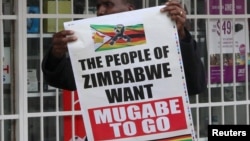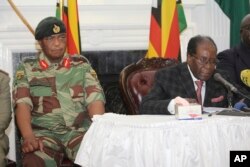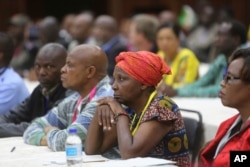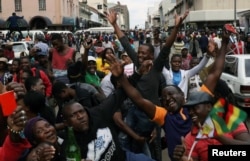Lawmakers in Zimbabwe have begun impeachment proceedings against longtime President Robert Mugabe after he ignored a Monday deadline to resign.
Speaker Jacob Mudenda opened debate Tuesday on the impeachment motion as thousands of protesters rallied outside parliament in Harare, demanding that Mugabe quit.
The president refuses to step down despite a takeover of state institutions by the military and calls for his resignation from members of his ZANU-PF party.
The motion includes charges that Mugabe abused his authority to position his wife, Grace Mugabe, as his successor. Mugabe hinted he would appoint her as vice president after he fired popular military hero Emmerson Mnangagwa earlier this month.
In a statement Tuesday, Mnangagwa said the people of Zimbabwe have spoken. He appealed to Mugabe to leave office "so that the country can move forward."
Mnangagwa added that he will not return to the country until he can be assured of his safety.
The 93-year-old president has shown no sign of willingly leaving the office he has held for four decades, and planned to hold a Cabinet meeting Tuesday.
Mugabe has been under house arrest since last week when the military seized key state institutions. The country's top military official said Monday that Mugabe was in touch with Mnangagwa, who was expected to return to Zimbabwe soon.
ZANU-PF set the deadline for Mugabe at a meeting Sunday where it also fired him as party chief and chose Mnangagwa as its new leader.
In Washington, a State Department official said “the future of Zimbabwe must be determined and established by the people of Zimbabwe” and that the United States supports the country's transition to democracy.
The official told VOA on Monday “whatever short-term arrangements the [Zimbabwe] government may establish, the path forward must lead to free and fair elections, in which the people of Zimbabwe, free to assemble without interference and to voice their opinions without fear, choose their own leaders. “
On Saturday, thousands of exuberant Zimbabwean demonstrators flooded the streets of Harare, some of whom marched toward the official residence of Mugabe amid nationwide protests calling for his resignation.
“The people of Zimbabwe took peacefully to the streets and firmly voiced their desire for a new era that will bring an end to Zimbabwe’s isolation and allow the country to rejoin the international community,” said the State Department official.
Shaderick Guto, a professor emeritus of the University of South Africa, told VOA that Mugabe is "trying to play games" because he knows the army fears being ostracized by the Southern African Development Community (SADC) and the African Union if it stages a coup. Neither organization condones the unconstitutional removal of an elected government.
Zimbabwe has been in serious economic and political turmoil since the late 1990s.
Mugabe is the world's oldest head of state. He took power, first as prime minister then as president, in 1980 when Zimbabwe won independence from Britain and ended white minority rule.
Although he initially brought some benefits to the black majority and the poor, Mugabe's authoritarian rule has destroyed Zimbabwe's economy, discouraged foreign investment and stifled any political challenges through violence, intimidation and what the opposition says have been rigged elections.
VOA's James Butty in Washington, D.C., and State Department Correspondent Nike Ching contributed to this report.








